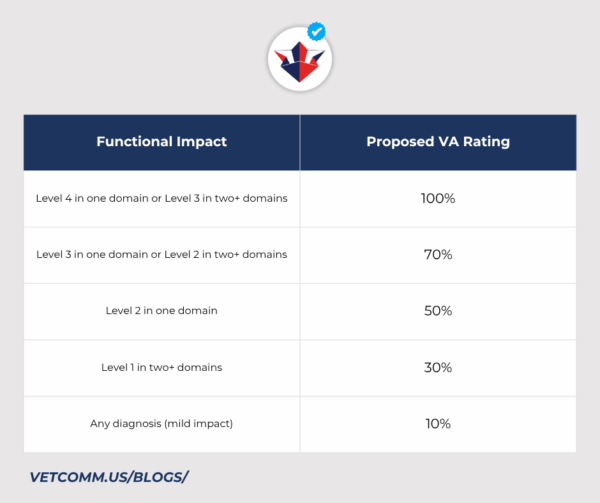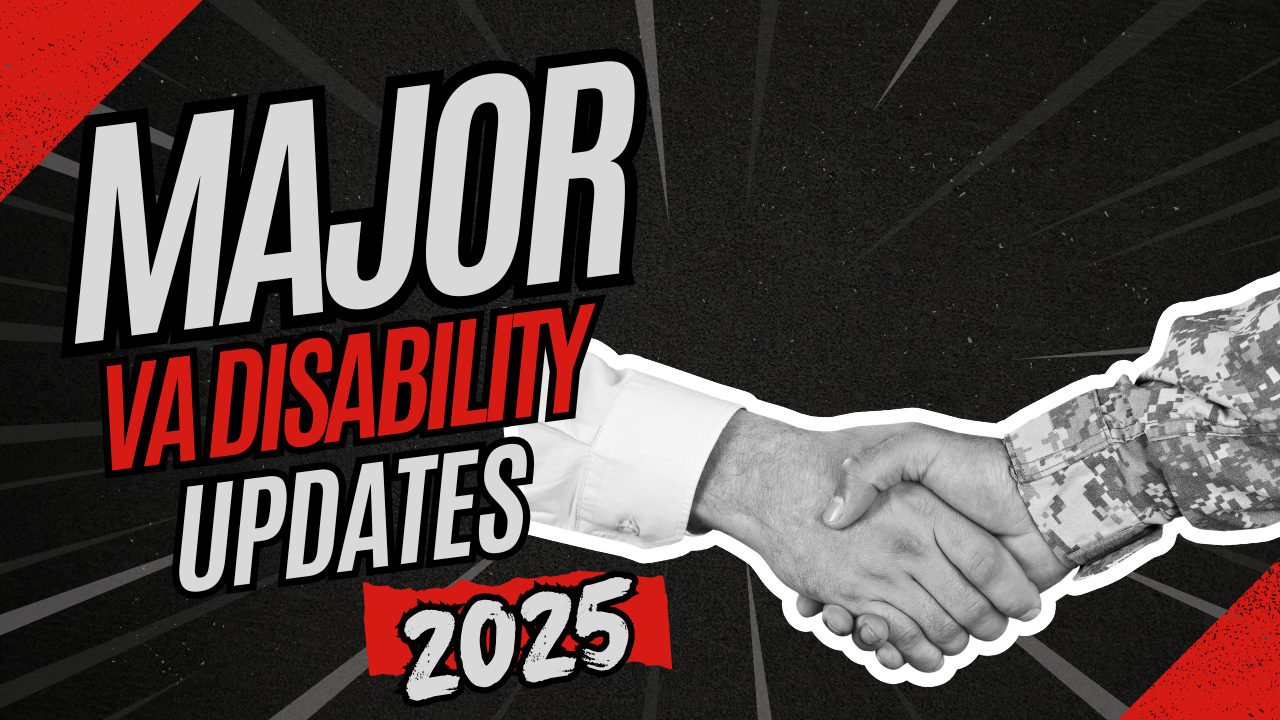What Veterans Need to Know About the 2025 VA Disability Rating Changes
Big changes are on the horizon for Department of Veterans Affairs disability ratings, as of August 2025—and they could directly affect the benefits veterans receive. The VA is moving forward with major updates to how several of the most commonly claimed conditions are evaluated, including mental health disorders, sleep apnea and tinnitus. These proposed changes aim to modernize outdated criteria and bring greater consistency to the evaluation process. However, they also introduce the potential for reduced compensation.
At VETCOMM US, we’re committed to ensuring veterans are fully informed and equipped to take action. Whether you’re currently rated or planning to file a claim, it’s critical to understand how these changes may affect your case—and what you can do now to protect the benefits you are owed.
In this article, we’ll break down:
- The new domain-based model for rating mental health conditions.
- Revised criteria for sleep apnea and the removal of tinnitus as a standalone claim.
- The impact on existing, pending and future claims—and the urgent steps veterans should consider before final rules take effect.
Mental Health: Functional Domains Replace Subjective Criteria
One of the most significant changes in 2025 will be how mental health claims are evaluated. The VA is moving away from subjective language, such as “occupational and social impairment,” and adopting a more structured, domain-based system.
Under the proposed rule, each mental health claim will be evaluated across five distinct domains:
- Cognition
- Interpersonal interactions
- Task completion & Life activities
- Navigating environments
- Self-care

Veterans will be rated based on the level of impairment they experience in each domain, ranging from minimal to severe. The new scale eliminates the 0 percent rating. Every diagnosed mental health condition will qualify for a minimum of 10 percent, even if symptoms are mild and do not substantially impair function.
For example, a veteran with significant difficulty in two or more domains may qualify for a 70 percent or 100 percent rating, depending on the severity. This model allows veterans with conditions like PTSD, depression or anxiety to receive compensation that more accurately reflects their daily challenges, regardless of whether they are employed or appear “functional” in traditional terms.
Sleep Apnea: Focus Shifts from Treatment to Symptom Severity
Sleep apnea is another area where the VA is proposing changes. Under current rules, veterans who use a CPAP machine typically receive an automatic 50 percent rating. The new criteria will tie ratings more closely to how effectively treatment manages symptoms.
The proposed structure is as follows:
- A 0 percent rating will apply if the veteran is asymptomatic, regardless of treatment.
- A 10 percent rating will be awarded if symptoms are mild but persist with treatment.
- A 50 percent rating will apply only when symptoms are severe and persist despite treatment, or when treatment is contraindicated or intolerable.
This marks a major shift in how sleep apnea claims are evaluated. Previously, veterans who were prescribed a CPAP machine—a device that helps keep airways open during sleep—were typically awarded a 50 percent disability rating, regardless of symptom severity. Under the proposed changes, that rating would depend more on how the condition affects a veteran’s daily life. Simply using a CPAP would no longer guarantee a high rating.
Tinnitus: No Longer a Standalone Condition
Tinnitus, or persistent ringing in the ears, is one of the most commonly filed VA claims. Under the previous system, it was rated at 10 percent—even if it was the only condition a veteran claimed. However, under the proposed 2025 rules, tinnitus would no longer be considered a standalone compensable condition.
Under the new framework, tinnitus would only be considered for compensation if it is caused by or secondary to another service-connected disability, such as traumatic brain injury or hearing loss. If a veteran files a tinnitus-only claim, it may be denied outright under the revised rules.
How Current, Pending and Future Claims Will Be Affected
Veterans who already have a service-connected rating under current rules will not see any automatic changes. The VA has confirmed that existing ratings will be “grandfathered,” meaning they will remain in effect unless the veteran files for an increase, reevaluation or secondary condition. However, the new rules will apply to any claims that are still pending at the time the changes go into effect. This includes initial filings, appeals and supplemental claims.
What Veterans Should Do Now
Veterans should begin thoroughly documenting their symptoms, including treatment records, personal statements and third-party observations. Mental health claims, in particular, benefit from detailed evidence that shows how symptoms affect specific areas of daily functioning. It’s also crucial to attend your Compensation & Pension (C&P) exams, as these evaluations play a significant role in determining your disability rating.
Finally, veterans are encouraged to stay informed. VETCOMM US will continue providing timely updates on VA disability rating changes through all our social platforms to help veterans stay informed and empowered.
Conclusion
The proposed 2025 updates to the VA rating system are designed to improve accuracy and fairness, particularly in the evaluation of mental health conditions. However, these changes may also result in reduced compensation for veterans with conditions like sleep apnea and tinnitus.
Understanding how these updates affect your specific situation—and acting before the new rules are implemented—can make the difference between a denied claim and the full benefits you are owed. At VETCOMM US, our mission is to ensure every veteran receives what they have earned through service. If you're uncertain about your next steps, we encourage you to begin with a free claim review.
If you’re interested in learning more about these changes, check out our detailed video breakdown on the VETCOMM US YouTube channel: MAJOR Mental Health Rating Changes Starting in AUGUST | VA Disability Ratings

